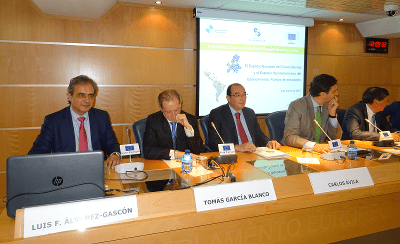“GMV shares and transfers knowledge in the various countries it operates in”

Luis Fernando Álvarez Gascón, CEO of GMV Secure e-Solutions, took part in the panel discussion titled “Transfer of business knowledge: Cooperation between companies. The multilatinas in Europe and the European companies in Latin America”, held during the event “the European Knowledge Area and the Ibero-American Knowledge Area” in the headquarters of European Institutions in Spain. After running through the university-related origins of GMV and sharing its wide-ranging experience of collaboration with companies and organizations of various countries and varying nature, he defended the role of multinationals in the generation and international transfer of knowledge. The fellow panelists with whom he shared points of view included the Managing Director of the Foreign Trade Institute (Instituto de Comercio Exterior: ICEX), Francisco Javier Garzón, REPSOL’s Regional Executive Director of Europe, Africa and Brazil and the Executive Director of the Fundación Eurochile.
Although GMV’s initial growth came mainly from European Space Agency projects, “learning its trade” at first on the strength of international collaboration, nowadays, as international leader in several of the sectors it trades in, it transfers knowledge between various parts of the world, in the words of Álvarez Gascón. The company’s unflinching pledge to innovation and its experience in breaking into new markets took up a good part of his intervention.
Transfer Channels
The role of research centers and universities in the generation of knowledge is undebatable, as the CEO pointed out. “There must be a firm government commitment to driving this generation and collaborating with companies in the interests of an innovative business fabric”.
In his opinion, in the framework of university-business cooperation in Latin American countries, there must be a clear demarcation between their respective roles in knowledge transfer, avoiding a situation in which universities “straying beyond their mere research remit, invade business territory, hemming in the development of the companies concerned”. In turn, the establishment of a clearly-defined collaboration framework between both sectors in research and knowledge transfer will ensure that R&D efforts translate into marketable developments.
It should not be forgotten that one third of R&D investment in many OECD countries comes from the private sector. The ideal situation, therefore, would be “to encourage joint work between companies and research bodies, directed at purposeful challenges”.
Luis Fernando Álvarez Gascón also stressed the importance of establishing joint working areas and claimed, on behalf of companies, “that cooperation ecosystems are being generated between different technological providers with research centers”, while the public sector’s effort should perhaps be greater “driving international cooperation programs and favoring the creation of a transnational industrial R&D area as well as the tabling of public policies that favor labor mobility, research and collaboration between research centers and companies”.
The CEO also called attention to the digital transformation process that is setting the economic pace in comparable countries, stressing the “obligation of taking up a firm position in this digital economy with a solid proposal that stands out in its own right within the value chain”.
Open Science, Open Innovation, Open to the World
The event was closed by Carmen Vela, Secretary of State for R&D, who pointed out the boost experienced by Spain after joining the European Knowledge Area. She also explained that Spain has expressed to European organizations its firm commitment to “serve as a HUB between Ibero-America and Europe”.
Along these lines she pointed out the three thrusts where Spain, according to agreements reached in Brussels, is going to work to drive the transfer of knowledge and research: “the creation of a project evaluation bank; the setting up of an Ibero-American mobility portal and the establishment of a shared scientific-infrastructure axis”. The overall aim is to bring the worth of science and research home to Spanish and Ibero-American public opinion. It is at the same time a commitment to “open science”, facilitating the publication and dissemination of knowledge. Vela wound up with the forthright claim that “the future lies in open science, open innovation open to the world".
Open Science, Open Innovation, Open to the World Document